Ear plugs, bathing caps, hydrogen peroxide and hair dryers can all help keep ears clean and dry
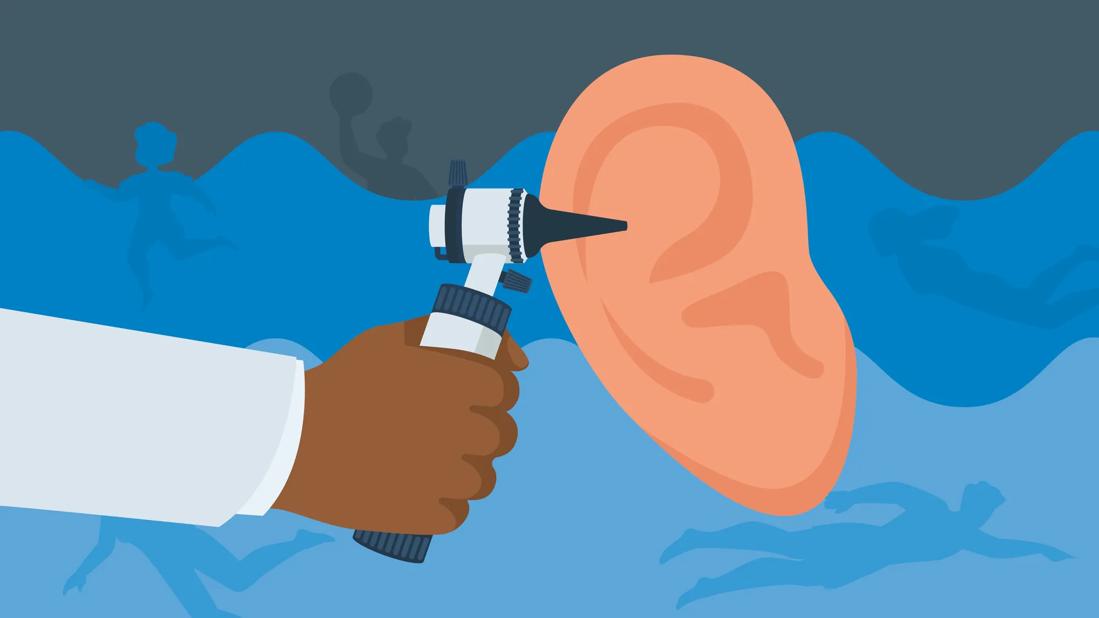
Whether you’re surfing at the height of summer, counting laps at your gym’s indoor pool or celebrating the holiday season with a polar plunge, this much is certain: Swimmer’s ear can really dampen the mood.
Advertisement
Cleveland Clinic is a non-profit academic medical center. Advertising on our site helps support our mission. We do not endorse non-Cleveland Clinic products or services. Policy
But what is swimmer’s ear exactly? And why do we call it “swimmer’s ear” if you don’t have to swim to get it? We talked to head and neck specialist Richard Freeman, MD, to find out what causes this unpleasant condition and what you can do to reduce your chances of getting it.
You don’t have to swim to get swimmer’s ear, also called otitis externa — but water is definitely part of the equation. So, what is it about water that causes swimmer’s ear?
Bacteria that normally inhabit the skin and ear canal multiply in warm, wet conditions and cause irritation, infection or inflammation. Occasionally, a fungal infection causes the same result.
“The ear canal is dark and warm, so if it gets wet, you have all the ingredients for a petri dish to grow bacteria,” Dr. Freeman explains.
The condition’s more common when you’re in water often. But you don’t have to swim regularly to get swimmer’s ear. You can also develop it by doing daily activities like bathing and showering!
Swimmer’s ear is also more common in warm weather. A landlubber’s ear can become infected because the bacteria is more likely to get damp from summer heat, humidity levels and perspiration.
You can reduce your risk of swimmer’s ear by keeping your ears clean, dry and irritant-free. Ways to do that include:
Advertisement
You’re more likely to get swimmer’s ear if you swim in natural bodies of water or pools and hot tubs that aren’t properly maintained. It also raises your risk of contracting waterborne diseases.
Clean your ears occasionally with a 3% hydrogen peroxide solution. That can help remove excess earwax, which can trap water in your ear.
Use about half of an ear dropper full. Let it bubble and fizz. Then, turn your head to the side and pull back on the top of your ear to allow it to drain properly.
Make sure you use drying drops (if approved by your provider) or use a hair dryer to ensure no moisture gets left behind in your ear canal.
Speaking of hair dryers, you can use one any time you need to dry out your ear canal gently and indirectly. Just make sure you’re using low or no heat and keep the dryer a safe distance from your skin.
It’s tempting, we know. But cotton swabs can scratch the skin in your ear canal and make conditions worse. They can also damage your eardrum and stimulate an over-production of ear wax.
One of the reasons we have wax in our ear canals is to protect them from infection, so let it be!
If you feel like your ears are truly clogged with the stuff — and a 3% hydrogen peroxide solution isn’t helping — contact a healthcare provider. They can check your ears and decide how best to remove excess wax.
While not the most attractive swim accessories, ear plugs and bathing caps can help keep water out of your ears.
But remember: They can also trap water in your ears. So, no matter how careful you are to keep your ears dry in the pool, dry them thoroughly after swimming.
Especially if you struggle with dry, sensitive skin (or a condition like eczema), it’s important to keep potential irritants out of your ear canal. For example, try using earplugs or cotton balls to cover your ears while you style your hair.
They sound like a magic bullet in the fight against swimmer’s ear, but ear-drying drops aren’t for everybody — especially people who have other medical issues involving their ears.
Before using these products, make sure you’ve:
They’ll let you know if the benefits of ear-drying drops outweigh the risks — and teach you how to properly use the products.
Following all of Dr. Freeman’s do’s and don’ts isn’t a guarantee that you won’t get swimmer’s ear at some point. But there’s good news: Swimmer’s ear is treatable. And if you act quickly, it shouldn’t cause significant damage.
Typically, you can identify a swimmer’s ear infection by:
Advertisement
You may be able to reduce the inflammation by cleaning and drying the ear canal. In most cases, this requires applying antibiotics or anti-fungal ear drops. The drops need to reach your skin in order to work, so cleaning your ear with hydrogen peroxide, for example, is important.
If you look on the internet, you’ll find home remedies for swimmer’s ear. But according to Dr. Freeman, a trip to a doctor is your best bet. That way, you don’t risk undertreating the condition or making it worse. A provider can:
If it doesn’t resolve (or gets worse) after a week to 10 days of treatment, Dr. Freeman advises that you follow up with your provider. You also need to pick up the phone if you:
“If left untreated, swimmer’s ear can get worse and harder to treat,” he warns. “Occasionally, you might need prescription oral antibiotics and, in extreme conditions, may need to be admitted to the hospital.”
Advertisement
You may be surprised to learn that the shape of your ears can make you more or less likely to get swimmer’s ear. But that’s not the only factor that determines your risk. Other medical conditions play a role, too.
For example, people with diabetes are also more prone to the condition. And having allergies or skin conditions like eczema, psoriasis or seborrhea can increase your risk of swimmer’s ear — or make the infection worse.
You can’t change the shape of your ears or your medical history. But keeping your ears clean, dry and free of irritation can stack the deck in your favor.
Advertisement

Sign up for our Health Essentials emails for expert guidance on nutrition, fitness, sleep, skin care and more.
Learn more about our editorial process.
Advertisement

You can find sweet relief by swallowing, yawning and doing specialized maneuvers

Yes, ear pain can result from seasonal allergies, causing even more issues

Turning your head to the side and pulling your ear up and back is one common tactic for relief
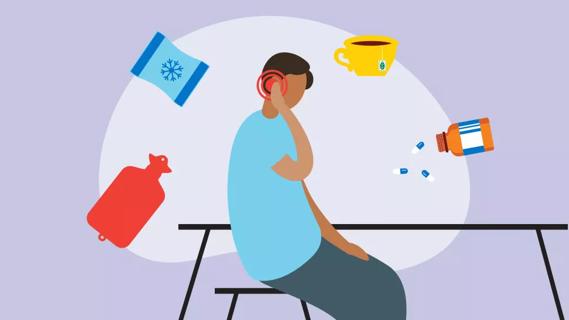
Not all ear infections need antibiotics — cold and warm compresses and changing up your sleep position can help
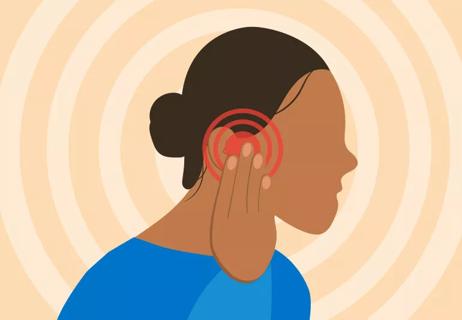
Ear infections can be painful, but essential oils may make the problem worse
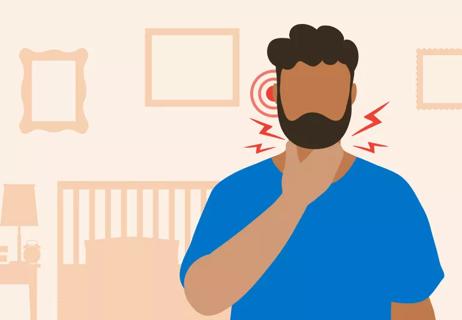
Throat and ear pain that lasts more than four weeks deserves serious attention
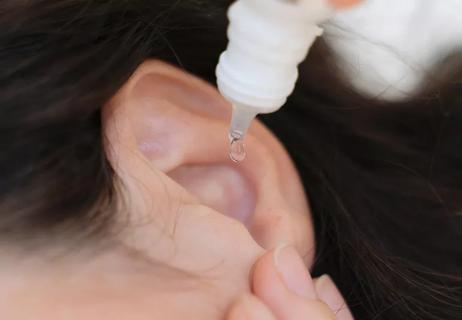
How to find a fix for the itch
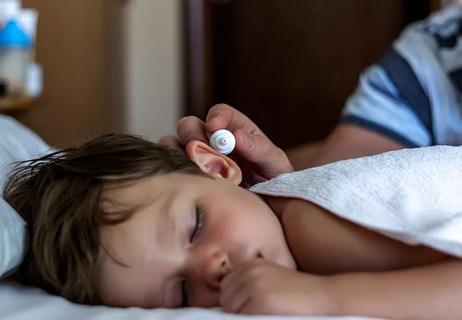
And two remedies to avoid at all costs

Even small moments of time outdoors can help reduce stress, boost mood and restore a sense of calm

A correct prescription helps your eyes see clearly — but as natural changes occur, you may need stronger or different eyeglasses

Both are medical emergencies, but they are very distinct events with different causes